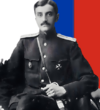Constitutionalist Party of Russia
This article is incomplete because it is pending further input from participants, or it is a work-in-progress by one author. Please comment on this article's talk page to share your input, comments and questions. Note: To contribute to this article, you may need to seek help from the author(s) of this page. |
Constitutionalist Party Конституционалистская Партия | |
|---|---|
 | |
| Abbreviation | KП |
| Leader | Alexander Guchkov |
| Founded | July 5, 1925 |
| Merger of | Constitutional Democratic Party The Union on October 17 |
| Headquarters | Lavr Kornilov Plaza, Novoarchangelsk |
| Newspaper | Voice of Novoarchangelsk (Russian: Голос Новоархангельска) Free Speech (Russian: Свободная Речь) |
| Student wing | Constitutionalist Student Association |
| Membership (1930) | 31,229 |
| Ideology | Constitutional Monarchy Conservative liberalism Pluralism |
| Political position | Center-left to Center-right |
| Religion | Russian Orthodox |
| Colors | Blue |
| Slogan | Skill and work for the good of the Motherland (Russian: Умение и труд на благо Родине) |
| Duma | 19 / 50
|
The Constitutionalist Party (Russian language: Конституционалистская Партия, КП), is a center-left to center-right political party in Alaska. It is among the five large parties in the country holding seats in the Alaskan Duma. It is currently the government party.
History
Historical election results
Constitutionalist Student Association
Factions
Kadety
Comprised of former members of the Right wing of the Constitutional Democratic Party of the old Empire, the Kadety endorse a paternalistic liberal-conservative state, internal improvements, and reformist politics. The Kadety are also well-known as the most ardent defenders of the rights of minorities, and as such have a substantial, and very loyal voter base among Alaska's Jews and Native Alaskans.
Oktobristy
The Octobrists are named not for the Red October, but rather, for what they have dubbed the "White October", the October Revolution of 1905 that secured the introduction of constitutionalism and the Duma to Russia. They are generally descended from the party of the same name, though they have also attracted some other conservatives. More conservative than the Kadety, they tend to favor a less secular and more Russocentric political orientation, as well as being more cautious towards liberalization and reform. They are a competitor to the VSP (U) for the vote of many Russian conservatives, with much of their support coming from businessmen, the gentry, and urban conservatives.
